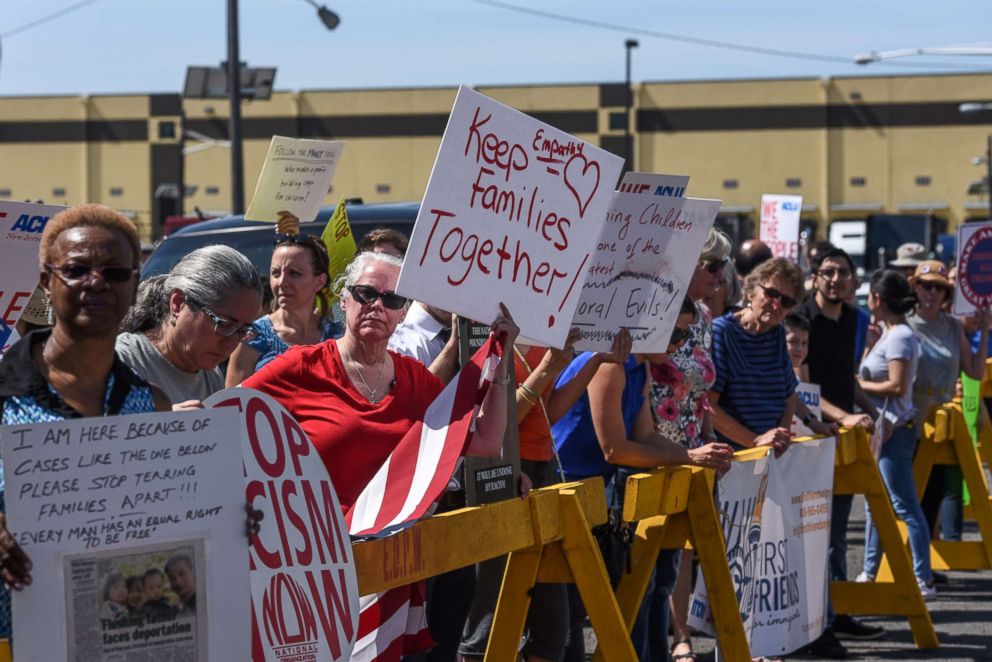Immigration: Separation anxiety
移民:分離焦慮
When immigration policies clash with values, the values usually win.
當(dāng)移民政策與價(jià)值觀沖突時(shí),通常價(jià)值觀會(huì)勝出。
In Texas an infant is separated from his mother by the federal government to deter others from coming.
在德克薩斯州,聯(lián)邦政府將一名嬰兒與其母親隔離開(kāi),以此警戒阻止其他人非法來(lái)到德克薩斯州。
In the Mediterranean a boat with some 630 migrants on board is prevented from docking at an Italian port,
在地中海,載著630位移民的一艘船被禁止在意大利港停靠,
and Italy's deputy prime minister seeks to boost his popularity by threatening to expel Roma people.
意大利副總理通過(guò)威脅驅(qū)逐羅姆人來(lái)提高自己的支持率。
In Berlin a coalition government may fall over how to handle immigration.
在柏林,聯(lián)合政府可能會(huì)因?yàn)槿绾翁幚硪泼駟?wèn)題而垮臺(tái)。
These things might looks eparate; in fact they are connected.
這些事情可能看起來(lái)各不相關(guān),實(shí)際上聲氣相應(yīng)。
The failure to gain political consent for immigration has been implicated in the biggest upheavals in the West:
移民未能獲得政治認(rèn)可和西方大的動(dòng)亂密不可分:
Brexit, Donald Trump's victory, the grip Viktor Orban has over Hungary, the rise of the Northern League in Italy.
英國(guó)脫歐、特朗普大選勝出、歐爾班·維克托對(duì)匈牙利的鐵腕統(tǒng)治、意大利北方聯(lián)盟崛起。
All these events have pushed politics in a direction that is worrying for those who prefer their markets free and their societies open.
這些事件驅(qū)導(dǎo)的政治方向,不利于希望市場(chǎng)自由、社會(huì)開(kāi)放的國(guó)家發(fā)展。
This creates a painful trade-off.
這就導(dǎo)致了令人痛心的妥協(xié)。
Resist the demands for more brutal immigration enforcement,
抵制更殘酷的移民執(zhí)法的要求,
and electorates may keep voting for candidates who thrive on blaming foreigners for everything.
選民可能繼續(xù)給喜歡將一切不如意歸咎于外國(guó)人的候選人投票。

Accept the solutions proposed by the likes of Mr Trump or Mr Orban,
接受特朗普或歐爾班等人提出的方案,
and Western societies will offend against their fundamental values.
西方國(guó)家將會(huì)違背其基本價(jià)值觀。
Take the White House's approach, which resulted in 2,342 children being separated from their families last month.
以美國(guó)政府的做法為例,上月有2342名兒童與家長(zhǎng)隔離。
To use children's suffering as a deterrent was wrong.
通過(guò)讓兒童受苦而起到威懾的效果是錯(cuò)誤的。
It is the sort of thing that will one day be taught in history classes alongside the internment of Japanese-Americans during the second world war.
這種事情總有一天會(huì)和二戰(zhàn)期間被拘留的日裔美國(guó)人一道成為歷史課本的內(nèi)容。
To argue that the administration had to act in this way to uphold the law is false.
辯稱(chēng)“政府必須以這種方式維護(hù)法律”是錯(cuò)誤的。
Neither George W. Bush nor Barack Obama, who deported many more people annually than Mr Trump, resorted to separations.
無(wú)論是喬治·W·布什還是貝拉克·奧巴馬,每年驅(qū)逐的人比特朗普還要多,但都沒(méi)有采取隔離孩子和家長(zhǎng)的政策。
To claim it was necessary to control immigration is dubious.
聲稱(chēng)有必要控制移民是不可信的。
In 2000 the government stopped 1.6m people crossing the southern border;
2000年,美國(guó)政府阻止了160萬(wàn)人跨越美國(guó)南境;
in 2016, when Mr Trump was elected, the numbers had fallen by 75%.
2016年特朗普當(dāng)選時(shí),這個(gè)數(shù)目已經(jīng)下降了75%。
Deterrence no doubt played its part, but prosperity and a lower birth rate in Mexico almost certainly mattered more.
威懾?zé)o疑發(fā)揮了作用,但在墨西哥,經(jīng)濟(jì)繁榮但出生率卻很低卻意味著更多。
No wonder, after a publicoutcry, Mr Trump abandoned the policy.
難怪在公眾強(qiáng)烈抗議后,特朗普放棄了這一政策。
譯文由可可原創(chuàng),僅供學(xué)習(xí)交流使用,未經(jīng)許可請(qǐng)勿轉(zhuǎn)載。



